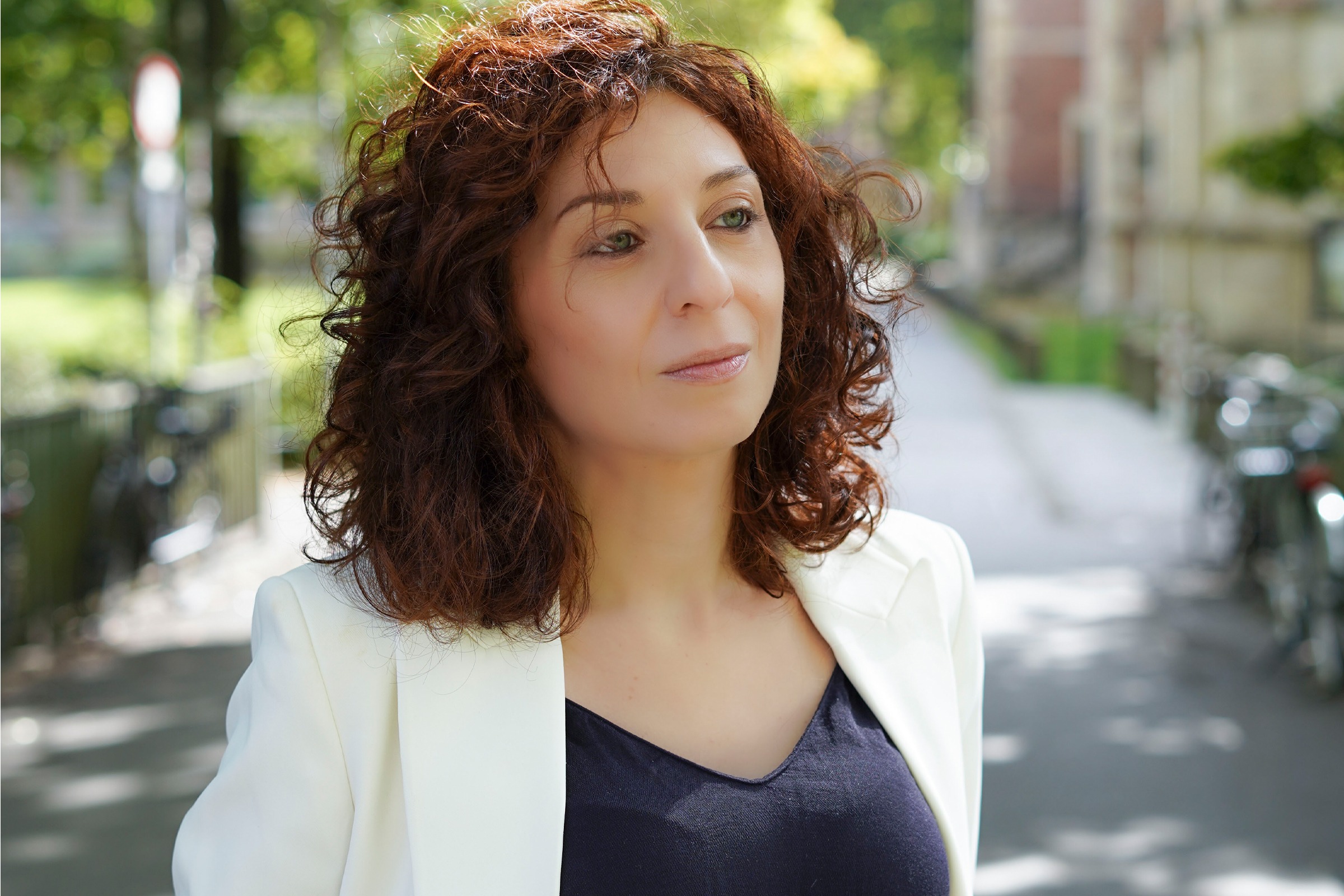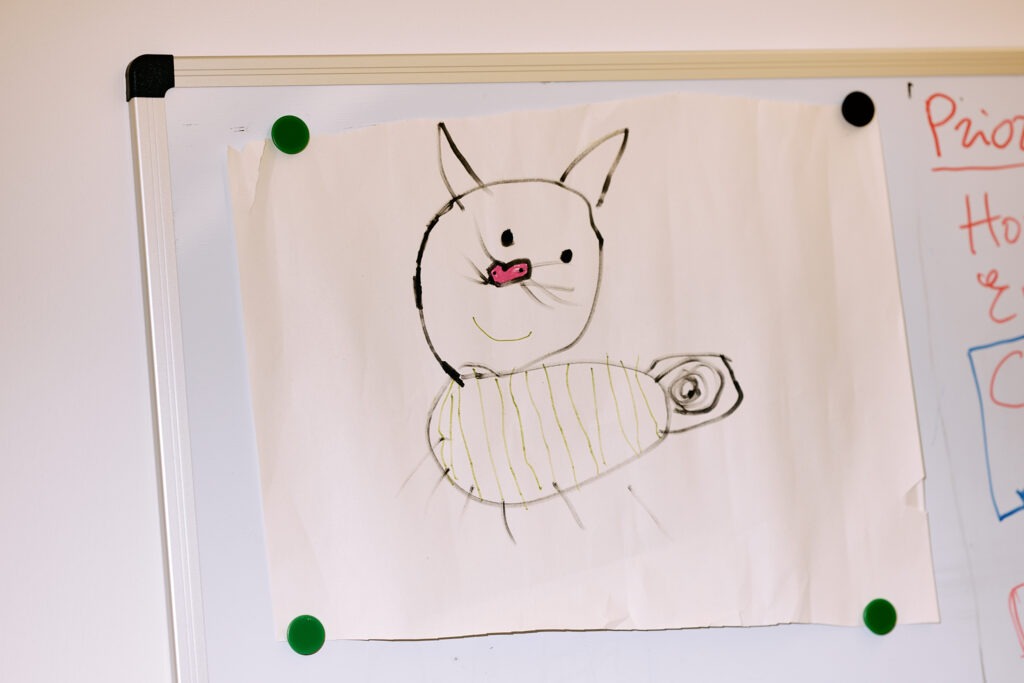
“If I Could Meet One Historical Scientist, I would choose Antonio Gramsci. I would Ask Him: How Do You Think We Should Fight Facism now”? – Dr. Maria Elena Indelicato on Impact, Inspiration, and Life in Münster
Welcome to our latest episode of the In Her Element interview series, where we sit down with inspiring WiRe Fellows to talk about their research, routine, and what it means to be a woman in research today.
In our second part of our conversation with Dr. Maria Elena Indelicato—a scholar of gender, cultural, and critical race studies—we revisit key milestones and future directions in the field, discuss academic life, hear why she would choose Antonio Gramsci for a time‑travel chat, and glimpse her research and day‑to‑day in Münster.

Dr. Maria Elena Indelicato
Scholar in Gender, Cultural & Critical Race Studies
Host Institute: English Department – Center for American Studies
Scientific Host: Prof. Dr. Silvia Schultermandl

Research Project
Why do we think that ‘feeling’ grounds our capacity to engage with the (socially constructed) ‘world’? And, relatedly, why do we think that certain people inherently possess a greater capacity to engage with the ‘world’ than others?

Maria Elena’s research helps …
… to unravel the origin of racism and achieve social justice.
You missed part one of the interview? Find it here!
Dining With Legends and Changing the Game: Milestones and ‘What Ifs’ in Gender, Cultural & Critical Race Studies
If you could have dinner with one historical figure from your field, who would it be and what would you ask them?
I must admit that I have been very lucky and have already had the honor and privilege to meet, and even collaborate with, scholars who are living legends. When I was doing research in Townsville, in the Far North of Queensland, I had the opportunity to meet Prof. Gracelyn Smallwood, a former member of the Australian Black Panther Party. People might not know this but at the height of the Black Panther Party in the U.S., which sought to empower Black Americans through community-based programs, self-defense initiatives, and activism, Aboriginal activists in Australia drew inspiration from it and organized an alike Party. Prof. Smallwood had even travelled to the U.S. where she met all the leaders of the Black Panther Party. At the same time, I was also introduced to Gary Foley in Melbourne, Victoria. Back in the 1970s, Gary Foley was the most prominent leader of the Australia Black Panther party. In Sydney, I also had the honor to meet Angela Davis, the late Lauren Berlant, Elizabeth Povinelli, Sara Ahmed, and many more great scholars!
However, considering the times we live in, if I could meet one historical scientist, I would choose Antonio Gramsci. Gramsci is universally known for having theorized the concept of hegemony. He taught generations of critical thinkers that popular culture and education should be our battleground. According to him, it is in these spheres that we need to fight to win the hearts and mind of our fellow citizens back from authoritarianism. However, today, I feel like the fight should be taken somewhere else and new tools are required. If I could meet him, I would ask him: how do you think we should fight against fascism now? If Gramsci was alive, he would know what to do, as he will be less concerned with job security and career advancement than we, scholars of the present, are.
What do you consider the greatest achievement in your field?
In the social science and humanities there are no such things as inventions or new technologies. We just deal with theories, arguments, and possibly findings. We normally do not think about what is happening in a given field as an achievement. However, and perhaps, when what we study makes it to the public and effects a positive change in society, we can speak of achievements. If this interpretation of your question is correct, then I would say that any policy directed towards guaranteeing the bodily integrity and self-actualization of all those who identify as women, queer, and non-binary count as an achievement in my fields. In the same vein, any policy that either protects or extends the rights of migrants and refugees negatively racialized as nonwhite, constitutes an achievement of my field. From this perspective, the right to safe abortion, maintain one´s culture, and gender self-identification could all be considered as achievements in my fields.
If time and money posed no limits, what big research project would you embark on next?
I would like to trace the histories of far-right´s uses of seemingly `innocent´ tropes across all Europe. I would like to put a team together to write the histories of how, why, and where these tropes emerged and travelled. These histories could help halting the current authoritarian wave we are now facing. They will be able to explain why far-right tropes have been so effective in engendering and sustaining societal divisions while moreover `normalizing´ what scholars of anti-gender movements and so-called gender critical feminists refer to as `eliminationist´ agenda.
Doing Science That Matters: Reflections, Advice, and the Highs & Lows of Academic Life
How does your research make a difference, directly or indirectly, to the world?
My publications are about very different topics. Consequently, their impact varies completely. For example, my work on migration and settler colonialism in Australia contributed to the field of settler colonial studies by illustrating how the narratives of migrants regarding their historical presence in a country align with, rather than contradict, the myths of national origin and development held by white settlers. Conversely, my book and co-authored articles with Sinophobia and Cold War epistemology expert Ivana Pražić provided the field of international education with the genealogy of the various problematic assumptions and tropes underpinning the field. The genealogy of the concept of `cultural distance´ and trope of the `Confucian heritage´ learner in particular opened said field to properly historicized decolonial critiques.
In a similar manner, my research on the Far Right in Europe has shown to scholars studying anti-gender movements that gender is not just about identity. Rather, it constitutes a technology of racialization white Europeans have used to assert their superiority and uphold their dominance over others. I have also done work on Chinese Cinema(s) but that work is greatly indebted to the expertise of my former colleagues Qiu Zitong and Yongchun Fu. Lastly, my not yet published work on the history of affect and anti-blackness will bring disparate fields of study together by showing that affect – the human capacity to perceive the world sensorily – has always been conceptualized in tandem with anti-blackness.
What advice would you give to young women starting a PhD today?
To be realistic about career prospectives and be willing to move. Precarity isn’t fun and staying put in one place is nearly impossible.
What do you love most—and least—about being a researcher?
My favorite part is teaching. My least favorite part is competing for funding and applying for positions.
If you could change one thing about the academic systems you’ve worked in, what would it be?
I have always been so occupied with understanding the rules of engagements from place to place that I never had the opportunity to pause and reflect upon what could be changed for the best. After spending almost twenty years studying and working in Italy, Australia, Portugal and Germany, I have come to realize that job insecurity has become a permanent aspect of academia, accompanied by the relentless drive to secure funding. I have always perceived that China provides more job stability. However, academics there are significantly overworked and increasingly compelled to vie for opportunities. Besides the fact that resources earmarked for project funding have always been inadequate, successfully applying for grants has become less a reflection of sound and/or valuable scholarship than a skill. Therefore, I find myself wishing that academia approached funding differently, allowing everyone the chance to conduct research without the constant competition against one another.
What has been your best experience as a researcher?
Teaching undergraduate students at the Ningbo Tech University and the nearby University of Nottingham Ningbo China. You might think that teaching does not involve research, but during my time at the Ningbo Tech University, I was afforded the chance to create all the courses I taught from the ground up. I seized this opportunity to delve into new topics, learning alongside my students about new theories and concepts. Consequently, I developed each of these courses as if they were books covering diverse yet interrelated issues of gender, sexuality, and race, striving in each lecture to present a coherent argument while constructing a comprehensive theoretical framework. During the period, from 2014 to 2018, my objective was to transform each course into either cultural studies or gender and cultural studies textbooks specifically designed for East Asian students enrolled in undergraduate courses taught in English. Although, I never had the time to turn these courses into textbooks, but I used the theoretical framework I developed for my course Queer Race: A Decolonial Approach to the Study of Gender and Media to examine the current the current connections between far-right populism, anti-gender movements, and white supremacist conspiracy theories in Europe. This analysis was presented in my article Understanding populist far-right anti-immigration and anti-gender stances beyond the paradigm of gender as `a symbolic glue´: Giorgia Meloni’s modern motherhood, neo-Catholicism, and reproductive racism, which I wrote together with my colleague Maíra Magalhães Lopes for the European Journal of Women´s Studies. Given that this article has consistently ranked among the most read in the journal since its publication, I consider my experience teaching undergraduate students at Ningbo Tech University to be my most valuable research endeavor, not to mention the fun I had while working with my students.
And what was your biggest research disaster, and what did you learn from it?
I cannot recall any disaster in terms of research, but I haven’t been always lucky with the organization of events. If there is anything I learnt about organizing events of different scales is that, ultimately, you have very little control about how they will turn out. I have also learned that no matter how organized you are, last minute cancellations, faulty equipment or any other crises of this sort will occur and there is very little you can do besides smiling and relying on guests´ understanding.
New Discoveries off Campus: Everyday Life, Local Surprises, and Favourite Things in Münster
Living in Münster, what foods do you enjoy most?
Here in Münster, there are lots of places where you can eat really good food, German and not German. I really love bagels, which I did not eat much before moving here. I also really like eating deep fried fish at the market in Domplatz, which is where we also buy the best dips and olives in town. At the same time, there are lots of restaurants where you can eat excellent Syrian and Turkish food and there are even more places where you can eat a very good pizza. Of course, since I live in Münster, I became a big fan of French fries, gummies and sparkling water, medium sparkly, of course!
What is your favourite German word?
Speaking of food, my 5-year-old learnt to say `schade marmelade´ at her kita and this expression stuck with me, and it is now my favorite one!
What makes you happiest in your daily life in Münster?
A sunny day. Whenever there is the sun (and it happens more than I expected), everybody rushes to streets, parks, lake and canals, swimming pools, cafés, markets and so on. Everybody is out enjoying the sun with their family and friends. Münster is pretty all year long, but when it sunny, Münster is just beautiful. The lifestyle is great! It is a very livable city, where you can cycle everywhere. There is always something you can do and almost everything is quite affordable. I also love how child friendly this city is. Münster is most definitely the best place to raise young children in.

